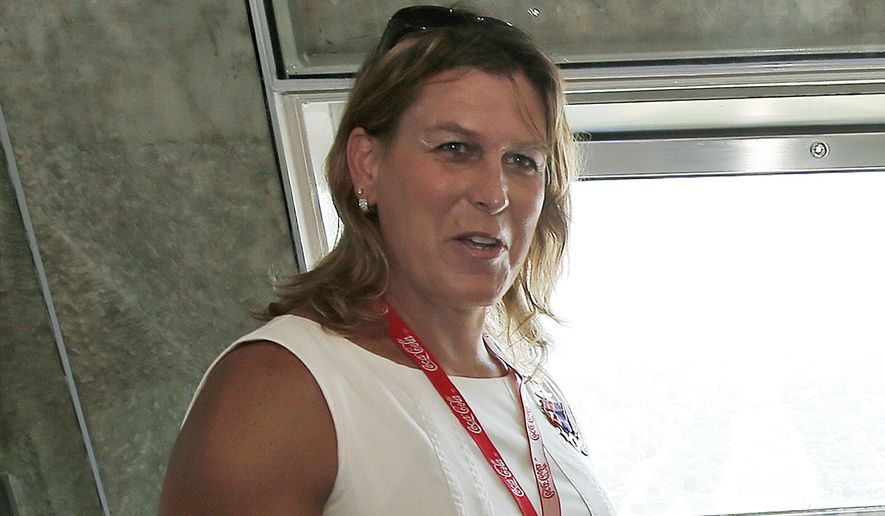After more than 20 years in uniform, Navy SEAL Christopher Beck walked into the Pentagon as a civilian wearing a dress and new name — Kristin.
For Kristin, who hid her transgender status for the 20 years in the Navy, the Obama administration’s push to integrate transgender troops into the military will only get one shot. And while she’s “elated” about the step forward that will let the estimated 15,000 currently serving transgender troops to reveal themselves, she agrees with critics of the move on one major thing — the integration must not decrease military readiness.
“We have a shot at this right now to get this right,” Ms. Beck said. “This thing cannot affect operational readiness, we can’t have huge hiccups.”
Ms. Beck served as a Navy SEAL from 1990 to 2011, deploying 13 times and earning awards for valor, including the Purple Heart and Bronze Star with “V.” After retiring from the military in 2011 and, after beginning work as a civilian in the Pentagon, she began her transition in 2013.
“One day, I was working at the Pentagon in a suit and tie on Jan. 31,” she said. “Feb. 1, I went into work with a dress on — a very subdued, super low key grey dress.”
The Pentagon announced Monday that it is establishing a military-civilian working group to examine over the next six months how lifting the ban on transgender troops would affect military readiness. Defense Secretary Ashton Carter said the working group will operate under the assumption that transgender troops can serve openly and be successfully integrated into the military.
SEE ALSO: Defense Department likely to allow transgender troops in military
“At a time when our troops have learned from experience that the most important qualification for service members should be whether they’re able and willing to do their job, our officers and enlisted personnel are faced with certain rules that tell them the opposite,” Mr. Carter said in a statement. “We have transgender soldiers, sailors, airmen, and Marines — real, patriotic Americans — who I know are being hurt by an outdated, confusing, inconsistent approach that’s contrary to our value of service and individual merit.”
Because of her experience transitioning, and well as the stories of hundreds of transgender troops who have reached out to her, Ms. Beck, who is planning a 2016 Democratic primary challenge against Rep. Steny Hoyer, Maryland Democrat, said she also hopes to be a part of the working group.
Listening to troops is one of the things that made another military social reform under the Obama administration go so smoothly, said Ian Thompson, a legal representative who works on LGBT issues at the American Civil Liberties Union.
When the military was considering repealing Don’t Ask, Don’t Tell and thus allowing homosexuals to serve openly, the military solicited feedback from troops who had to live in uniform under current regulations.
“I think there’s a lot they can learn from hearing directly from those people,” Mr. Thompson said.
Under the current rules that the new working group will aim to lift, transgender troops can be kicked out of the military for revealing their gender identity. When asked if this current ban might discourage transgender troops from voicing their opinion, Ms. Beck said she felt confident service members would share their story. One, Army Sgt. Shane Ortega, met with leaders at the Pentagon last week, she said.
“I know that the secretary of the Army and all the people in that room were listening, taking notes, and very interested in every word he said,” she said.
While the working group is studying the ban, all proposed discharges of transgender troops will be reviewed by Brad Carson, acting undersecretary of defense for personnel and readiness.
Many people may not know a transgender personally and don’t understand what the term even means, Ms. Beck said, causing a lot of uncertainty or fear of the change.
“There’s still a lot of ignorance amongst a lot of people about what transgender is. It’s not about sex, it’s not about fetish, it’s not about an underwear model on the cover of a magazine,” Ms. Beck said. “Transgender is the person who lives right next door, just normal people trying to live their lives.
Because of this opposition, a large part of the working group’s responsibility will likely also be developing an education program for all service members and leaders to ensure transgender troops get a welcoming environment, said Lori Hensic, director of research and policy at the American Military Partner Association.
Critics say that allowing transgender service members to be open about their service will hurt military readiness and unit cohesion.
“The president is once again using the military to deliver on a political promise to his LGBT constituency; none of this is being done to benefit or strengthen the armed forces,” said Elaine Donnelly, president of the Center for Military Readiness.
But Ms. Hensic said thousands of transgender troops are already serving today without incident and that similar critiques on lifting the ban on homosexual troops didn’t cause a decline in readiness.
“The very individual arguing that inclusion and open service may disrupt morale or unit cohesion may very well have a transgender service member under their command, they just don’t know it yet,” Ms. Hensic said.
• Jacqueline Klimas can be reached at jklimas@washingtontimes.com.




Please read our comment policy before commenting.